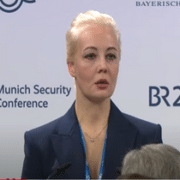The Most Powerful Spokespeople Have a Story Behind Them
The dignity and pain of Yulia Navalnaya, widow of Russian opposition leader Alexei Navalny, made her speech at the Munich Security Conference incredibly powerful. She then updated her message and criticism of the regime on video, to ensure it reached as many people as possible.
Someone, I assume, who is not used to public speaking, was taking to the world stage at a time of great pain.The standing ovation of the politicians and diplomats was in itself immensely moving.
Here are a few other examples of people who helped, or are helping, to achieve change because of their personal stories.
Malala Yousafzai, who was shot in the head age 15 because of her insistence that girls in Pakistan had a right to go to school. She survived and now lives in Birmingham in the UK. She is still an activist and is the youngest person ever to receive a Nobel Peace Prize.
Merope Mills whose daughter died in hospital of sepsis after a bike accident. Merope spearheaded a campaign to bring in Martha’s Rule which makes it a right for patients to ask for a second opinion, if they are worried about care in hospitals. We wrote about her BBC Radio 4 Today programme interview here. The government will introduce Martha’s rule into the NHS later this month.
Esther Rantzen has greatly increased interest and political pressure for assisted dying to become lawful. After a life in the public eye, she has stage four lung cancer and has called for MPs to have a free vote on the issue. Link to the LBC article here.
There are many more.
To the uninitiated, it may seem that these individuals are speaking primarily on their own behalf. But in all cases, they were or will be adopted and supported by organisations calling for change. Someone with a powerful personal story is a huge asset to any campaign.
Translate this to more everyday PR activities and the lessons are obvious. Nurture people who have a relevant personal story to tell, and make sure they are able to tell that story. That can sometimes take a bit of training. There is even a label now for this sort of spokesperson: they are said to have ‘lived experience’. Mind, the mental health charity, for example now has a web page offering journalists spokespeople who have lived experience of mental health issues.
As media trainers and public speaking coaches, it is always a privilege to work with this sort of spokesperson.
Image: YouTube
- Media Savvy Operators Know How to Place a Quote - May 21, 2024
- The Magic of Performance - May 14, 2024
- Our Top Tips: - May 8, 2024




Leave a Reply
Want to join the discussion?Feel free to contribute!